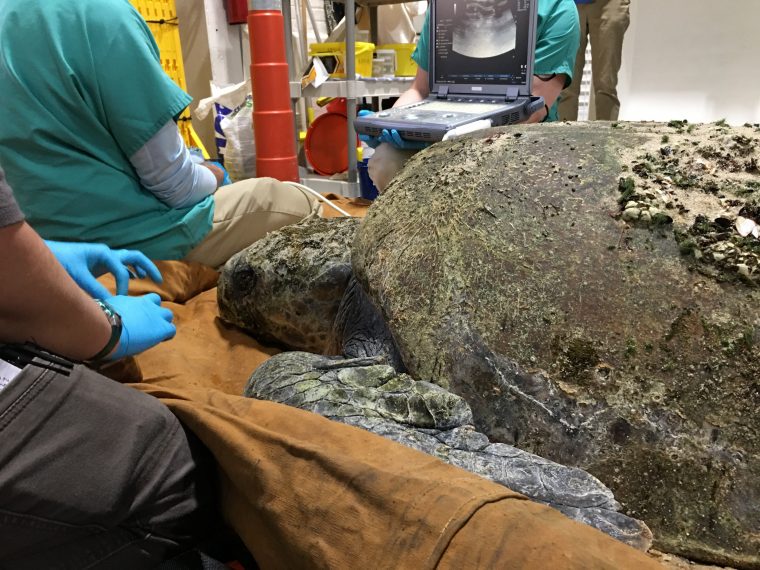152 turtles rescued from Cape Cod beaches treated at New England Aquarium so far this season, including rare adult male loggerhead

QUINCY, MASS. (November 23, 2020) – The New England Aquarium is continuing to partner with non-profit organizations on rescue and rehabilitation efforts during the pandemic as cold-stunned turtles strand on Cape Cod beaches, including a rare adult male loggerhead sea turtle.
As of Monday, staff and volunteers with Massachusetts Audubon Wellfleet Bay Wildlife Sanctuary have rescued 248 turtles this season; 152 of those turtles were taken to the Aquarium’s sea turtle hospital in Quincy, while 61 have received treatment at National Marine Life Center in Bourne. The turtles are treated for a variety of life-threatening medical conditions that are a result of weeks of hypothermia and the inability to feed, brought on by plunging ocean water temperatures. Most of the stranded turtles this season are Kemp’s ridleys, though the Aquarium took in a rare adult male loggerhead turtle on Friday. Wellfleet Bay Wildlife Sanctuary with the help of Truro DPW saved the turtle and brought him to the sea turtle hospital, where he arrived minimally responsive and was not initiating breaths on his own. Aquarium veterinarians and biologists administered medications and replacement fluids to help stabilize the turtle. The loggerhead is in guarded condition with multiple health problems, though he was swimming and breathing on his own.
“We have only had a handful of adult loggerhead turtles admitted for rehabilitation. When you compare this to thousands of Kemp’s ridley turtles that have been admitted in the same region, it gives you a good sense of the rarity,” said Connie Merigo, Marine Animal Rescue Department Manager at the Aquarium.
The COVID-19 pandemic means coordination among partner organizations is crucial to providing life-saving care to the sea turtles. With social distancing guidelines in place, rescuers must stay six feet apart while working to save these endangered species. The Aquarium has a flexible rehabilitation plan in place that accounts for pandemic-related restrictions when treating and stabilizing the turtles.
Once stabilized, the turtles are being flown to secondary rehab facilities along the East Coast and Gulf of Mexico to continue treatment. NOAA Fisheries has been working with Turtles Fly Too to coordinate these flights, which are freeing up valuable space for more cold-stunned turtles at the Aquarium and National Marine Life Center. Transport flights have taken 88 turtles to various rehab facilities across Florida and Georgia with more flights planned.
“It’s been a busy, record-breaking week for us at the National Marine Life Center. We admitted more cold-stunned sea turtles in one day than we ever have before,” said Lisa Becker, Director of Marine Wildlife Rehabilitation at National Marine Life Center. “Despite the challenges of working during the pandemic, we’re thrilled to be able to help these amazing animals. Sea turtle rescue, rehabilitation, and release take an extraordinary effort and require great partnership between multiple organizations.”
“Turtles Fly Too provides emergency air support for endangered species when needed. We coordinate between the various agencies to use ‘Turtle Fliers’ who volunteer their time, talents, and general aviation aircraft to fly our missions. Cold-stunned sea turtles need to be transported quickly to a remote treatment facility to receive the care necessary to be re-released into the wild,” said Leslie Weinstein, President of Turtles Fly Too.
Donations are critical to continuing this work in a challenging year. The New England Aquarium has launched the Mission Forward Fund, which directly supports the institution’s most urgent needs and allows it to fulfill its mission safeguarding ocean animals and habitats.
PHOTOS OF THE 2020 TURTLE STRANDING SEASON ARE AVAILABLE HERE
MEDIA CONTACT:
Pam Bechtold Snyder, psnyder@neaq.org; 617-686-5068
